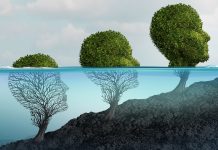There is a huge volume of literature, in bookstores and online, which contain recommendations for a more enjoyable life, in accordance with the hidden skills of each one of us. One of the great secrets put forward is freeing the mind from all negative thoughts.
For example, Kurt Tepperwein, leader of the International Working Group for Mental Training, recommends, for the process of acquiring super-intuition, the abandoning of guilt feelings and to get rid of absolutely all negative thoughts and psychic nuisance that do not belong to us.
Metaphysical super-promises…
Of course, the elimination of negative thoughts is desirable if they represent emotions and feelings born of vices and character flaws. It is very good to drive away hatred, envy, malice, the desire for revenge, the tendency to judge our fellow men, and so on.
Our consciences would descend into moral chaos if we no longer distinguished between qualities and flaws, virtues and vices, and no longer cultivated the positive ones, while rejecting the negative ones.
However, the gurus of spiritual evolution go further than this and suggest that the maximum individual, social, and metaphysical use of our conscience will not only create a world of peace and harmony, but will also open the treasure trove of paranormal skills, unconscious at first.
All the reader has to do is follow a multi-step process, accessible to anyone who is motivated enough. Conscience thus becomes a force for the psychic emancipation of the initiate, a rise above the negative attacks from around and within, an energy fuelled by higher sources of the Universe: light, gradual spiritual guides, the universal data bank, immortal souls, cosmic love, the sun, etc.
In other words, the condition of ‘superman’ is only a few steps away. However, before we get too excited, it’s a good idea to evaluate the available data with a little more lucidity.
…abolish the purpose of conscience…
Socio-humanistic disciplines consider consciousness to be the highest level of the human psyche, which is gradually built up from childhood. On the one hand, consciousness is defined as the domain of mental states that give us a coherent sense of our own existence and manifestation and that connect us lucidly to the world around us.
Thinking, as a process of the conscience, has the role of processing accumulated information and is always oriented towards investigating and solving problems.[1] On the other hand, conscience includes the moral instance of the psyche, the part that distinguishes between good and evil and regulates the interaction with others through common principles, rules, and values.
“Remorse,” or “qualms of conscience,” refer to the beneficial reflexive attitude by which the individual identifies their moral guilt and seeks to correct their mistakes. Therefore, a conscience “sterilised” by all that is negative would simply nullify its essential purpose of introspection, evaluation, and correction of nasty character traits, reprehensible conduct, negative thoughts, affections, and desires.
Genuine reconciliation with ourselves and the world and the true spiritual evolution towards a pure world cannot take place outside of morality.
They are possible only through regret, through the continual willingness to fix what we have done wrong, and through the abandonment of what drives away harmony from our lives. If, however, we see consciousness as a means of circumventing what causes us discomfort, a way to connect to para-realities by disconnecting from the negative realities to which we have contributed, this resembles the ostrich strategy rather than the creation or access to a world of harmony and peace of mind.
…of hitting the nail on the head.
Unlike animals, humans exercise, through conscience, free will—the ability to choose and decide freely and knowingly about their actions, hence their responsibility for them.
It is a special endowment, which helps humans to adapt to the social environment or to improve it, to cherish their fellows, to avoid shortcomings, risks, and obstacles—either for personal fulfilment as a moral being or for the wider development of the spirituality which they are capable of.
In this complex process, conscience functions like an inner mirror of our personality and life, reflecting more vaguely or more clearly changing figures, more or less pleasant.
It is up to us to polish the mirror well so that it will show us the flaws as accurately as possible and guide us in correcting what is shown to be crooked.
It is our advantage and duty to always consult our conscience, not to divert it from its purpose, so as not to turn it into a frightening picture of Dorian Gray,[2] which always transforms according to the feelings of the character, accumulating all the hideousness of his deeds throughout his life.
Corina Matei is a PhD lecturer at the Faculty of Communication Sciences and International Relations of the “Titu Maiorescu” University, Bucharest.



















